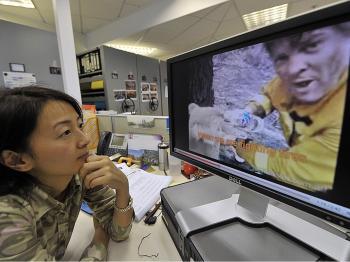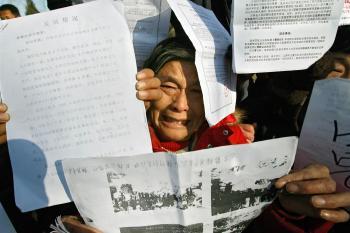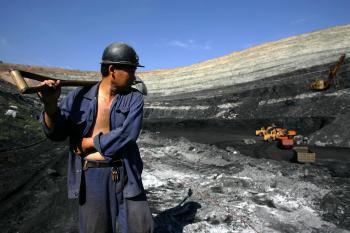In the past two decades, exports and foreign investment have been the two main driving forces that maintain China’s high gross domestic product (GDP) growth. However, the economic crisis in the United States and Europe has reversed China’s exports—they have gone from non-stop increases to an over 20 percent decrease in the past half year. As a result, tens of thousands of manufacturers have closed, and over twenty five million rural labors have lost their city jobs. These job losses do not negatively affect China’s official unemployment rate, since rural people are in any case excluded from the unemployment rate formula.
However, the CCP cannot ignore the negative impact that decreased exports have on the GDP. In the past nine years, the Chinese regime has enjoyed an average increase of 21 percent in government income each year, a rate that is twice faster than the growth of China’s GDP. The Chinese regime, the second richest government in the world, indeed has more disposable money than the U.S. government because it does not have similar social welfare obligations, obligations on which the U.S. government has to spend 60 percent of its income.
With unchallengeable power in China, the CCP officials have gotten used to consuming a huge portion of social wealth to maintain a luxurious and corrupt lifestyle. The CCP estimates that only when China keeps its GDP growth rate above 8 percent can the living standard of the majority of ordinary Chinese people not be noticeably affected by the corruption of its officials. Therefore, an 8 percent GDP increase has became a magic lower-limit the CCP believes it must maintain in order to preserve China’s social stability. In order to do this, the regime has to boost its domestic consumption to make up for the loss in exports.
Unfortunately, China’s real estate sector, the only bright spot in China’s lackluster domestic consumer market, is in the danger of collapse after seven years of explosive expansion. Also, for most of 2008, China’s stock market led the world in losses with a decrease of over 60 percent. With the uncertainty in the job market, the loss in the stock market, and an expectation of an adjustment in housing prices, Chinese are holding back on spending—the opposite of what is needed to prop up China’s GDP.
Media Campaign
Facing this deteriorating situation, Wen Jiabao, China’s premier, said, “Confidence is more important than gold.” Surely, it is ultimately the people who decide whether a stock or a house is overvalued or not. Making people believe that China’s economy is going to expand as it has regularly for the past 20 years will be the quickest and cheapest way to boost the stock and housing markets. With all of the Chinese media under the CCP’s tight control, and with the regime as the only authority empowered to release official economic data, restoring the Chinese people’s confidence is much easier than the people in the free world can imagine.
An unannounced campaign to boost people’s confidence in China’s economy has started. For example, to prevent the collapse of Chinese housing market, the regime issued a list of recommendations at the end of 2008 to “stabilize” the housing market. The last item in the list is to warn the media from releasing “irresponsible” reports and data that might disturb the order of China’s housing market.
Also, the regime announced a US$588 billion economic stimulus package around the end of 2008. Media worldwide put that number in their headlines. However, few of them mentioned that only one third of the US$588 billion was from the regime, with the remainder supposed to come from private and foreign investment. Even less did the media mention that many of the large construction items mentioned in the stimulus package, such as building more railroads, rebuilding the earthquake area, and so on, existed in the CCP’s plans even before the start of the financial crisis.
Similarly, the decision to widely publish the controversial profits made by Chinese state-owned corporations is part of this media campaign to restore confidence, and it aligns with the announcement of the inflated stimulus package. That the high profits may excite some discontent among ordinary Chinese people is expected, but nobody can deny the high profitability of these large Chinese corporations. The CCP hopes to use their profit reports as indicators of how strong the Chinese economy is.
Western Investment
Western media, such as Bloomberg News and CNN, tend to copy the regime’s economic data, such as the corporation profit numbers released in April, from the regime’s press releases and report them to the western world without analysis. In doing so the Western media help enhance the CCP’s carefully established notion that China is the only bright spot in the current worldwide economic crisis.
Making the world believe how profitable Chinese corporations are has became increasingly important to the regime, because China has seen international financial firms, including the Royal Bank of Scotland, UBS, Bank of America, Goldman Sachs, and American Express, dumping billions of Chinese banks’ stocks in the past several months.
Even though the reduction of international investment in Chinese banks’ stocks did not significantly damage Chinese banks’ market value, the mere suggestion that international investors could abandon China makes the CCP regime feel anxious. Foreign investment has been a driving force of China’s economic expansion in the past two decades, and is expected to continue to be a driving force for China’s economic transformation from that of being the world’s factory to a more environmentally friendly economy in the future. This transformation is crucial to the survival of CCP. More than two decades of rampant development has damaged China’s environment and natural resources to the point of directly threatening China’s social stability.
The CCP regime wants to use the huge profits made by these large Chinese corporations as bait to lure foreign investment in China. However, the fact that these highly profitable corporations are all state-owned may pose a question to savvy investors: lacking the protections enjoyed by those large Chinese corporations, how great are the odds that foreign companies might thrive in this far-east jungle?



